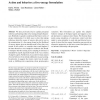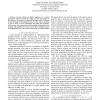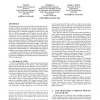2655 search results - page 529 / 531 » An agent model for fault-tolerant systems |
BC
2010
13 years 4 months ago
2010
We have previously tried to explain perceptual inference and learning under a free-energy principle that pursues Helmholtz's agenda to understand the brain in terms of energy ...
ICML
1999
IEEE
14 years 8 months ago
1999
IEEE
Excerpted from: Boyan, Justin. Learning Evaluation Functions for Global Optimization. Ph.D. thesis, Carnegie Mellon University, August 1998. (Available as Technical Report CMU-CS-...
IEEESCC
2007
IEEE
14 years 1 months ago
2007
IEEE
Web rule languages with the ability to cover various types of rules have been recently emerged to make interactions between web resources and broker agents possible. The chance of...
RTAS
2005
IEEE
14 years 1 months ago
2005
IEEE
— Convoy driving on public highways is a useful phenomena which increases the safety and the throughput of the highway. We present an approach through which a wireless Convoy Dri...
SWS
2004
ACM
14 years 27 days ago
2004
ACM
The Platform for Privacy Preferences (P3P), developed by the W3C, provides an XML-based language for websites to encode their datacollection and data-use practices in a machine-re...



